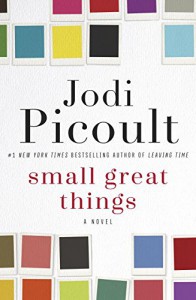
Small Great Things by Jodi Picoult

Not many books manage to do what this book has, make me think about the world differently. Before this book I thought about racism, but because I live in Ireland which is only beginning to become more diverse, it wasn’t as prevalent in my mind as it should have been. This book changed that.
Here’s the blurb, which describes the plot far better than I ever could:
Ruth Jefferson is a labor and delivery nurse at a Connecticut hospital with more than twenty years' experience. During her shift, Ruth begins a routine checkup on a newborn, only to be told a few minutes later that she's been reassigned to another patient. The parents are white supremacists and don't want Ruth, who is African American, to touch their child. The hospital complies with their request, but the next day, the baby goes into cardiac distress while Ruth is alone in the nursery. Does she obey orders or does she intervene?
Ruth hesitates before performing CPR and, as a result, is charged with a serious crime. Kennedy McQuarrie, a white public defender, takes her case but gives unexpected advice: Kennedy insists that mentioning race in the courtroom is not a winning strategy. Conflicted by Kennedy's counsel, Ruth tries to keep life as normal as possible for her family—especially her teenage son—as the case becomes a media sensation. As the trial moves forward, Ruth and Kennedy must gain each other's trust, and come to see that what they've been taught their whole lives about others—and themselves—might be wrong.
With incredible empathy, intelligence, and candor, Jodi Picoult tackles race, privilege, prejudice, justice, and compassion—and doesn't offer easy answers. Small Great Things is a remarkable achievement from a writer at the top of her game
This book was shortlisted as part of goodreads book of the year in the fiction category. I’d heard about it before when it was referred to as the To Kill a Mockingbird for the 21st century. To Kill a Mockingbird is one of my favourite books and I was very sceptical that anything could rival it. I’m not adverse to books being compared to one another because, after all, that’s how the mind works, by comparison. The marketing team are just taking advantage of this. However, a book rarely compares to its predecessor and this book was no different. While it was very good and a much needed book, the story wasn’t as fresh and the characterisation wasn’t in the same league.
The book was written in first-person, the chapters alternating between Ruth, Turk the white supremacist who was bringing charges against her and Kennedy, her lawyer.
Turk’s chapters were interesting and provided a glimpse into the mind-set of such a depraved individual. I did however find him quite cliche and liked the sections written from Kennedy’s POV the best. Kennedy was a character who wasn’t afraid to admit when she was wrong and owned every mistake she made. Her character arc was the most satisfying for me as she grew exponentially and really homed in on passive racism, which so many are guilty of. Ruth’s character-arc was depressing, but entirely understandable.
What this book was lacking was a flawed main character. Ruth was just too perfect. I understand the difficulty that an author faces when they’re trying to devise a flaw for a character who’s already under the kosh, but that just means the writer has to work harder to find something. I’m tackling a similar problem in my manuscript. The main characters are disabled and it’s difficult to assign flaws, which could have them viewed in a negative light. I believe that the alternative is worse though; possibly alienating readers. Ruth did lie at an early stage, but this lie was so justifiable that I didn’t clarify it as a flaw. Perhaps the blatant flaws of Turk were so big that the author relied on him. Regardless, because of what Ruth had to endure she had my deepest sympathy and this carried me through.
I found an incident towards the end of the novel very implausible and the speed with which this affected Turk equally implausible. It felt to me as if the author was trying to wrap things up far too conveniently and sugar-coat an insidious topic. I think the book would have been more realistic had it reflected reality in a more succinct way.
It sounds like I didn’t like the book, but I did. Race is something that needs attention and I deeply respect those that use their position to tackle the not so nice issues. I’ll always remember the book and it has added further to my knowledge of inequality.
 6
6
 6
6










